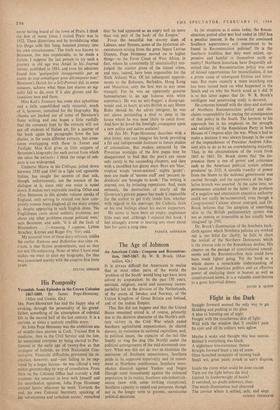The Age of Johnson
IT is always difficult for Americans to realise that in most other parts of the world the 'problem of the South' would long ago have been solved by amputation. In the past 150 years, national, religious, social and economic incom- patibility led to the division of the Netherlands, of the union of Sweden and Norway, of the United Kingdom of Great Britain and Ireland, and of the Indian Empire.
That this did not happen and that the United States remained united is, of course, primarily due to the decisive character of the North's mili- tary victory in the Civil War which ended Southern agricultural expansionism, its chattel slavery, its resistance to national capitalism, and, in political issues, the capacity of the tail (the South) to wag the dog (the North) under the political arrangements of the mid-nineteenth cen- tury. What war did not do was to eliminate the sentiment of Southern separateness, Southern pride in its supposed superiority and its resent- ment at Northern interference, Southern xeno- phobia directed against Yankee and Negro (though most immediately against the coloured population in its midst), Southern sub-industriali- sation (now with some striking exceptions), Southern capacity to retard and postpone, though not in the longer term to prevent, unwelcome political decisions.
In the situation as it exists today, the Recon- struction period after war had ended in 1865 has a peculiar interest. Is the reason for continued Southern separateness and resentment to be found in Reconstruction policies? Or is the Southern tradition that they were unjust, op- pressive and hateful in themselves myth or reality? Northern historians have frequently ad- mitted that the Reconstruction policy was one of missed opportunities for reconciliation, if not a prime cause of subsequent friction and bitter- ness. But more recently a more searching eye has been turned both on what happened in the South and on why the North acted as it did. It is to this latter aspect that Dr. W. R. Brock's intelligent and penetrating study is devoted.
He concerns himself with the ideas and motives of Northern Reconstruction policy and dis- claims responsibility for tracing the consequences of that policy in the South. The keynote to his approach lies in his emphasis on the strength and solidarity of the Republican Party in both Houses of Congress after the war. When it had to make a decision it was always (except in the case of the impeachment of President Andrew John- son) able to do so by an overwhelming majority. Thus, in the circumstances of the years from 1865 to 1867, Dr. Brock shows that 'the im- pression there is one of power and coherence such as the American political system seldom produces' (p. 212). A sizeable transfer of power from the States to the national government was carried through, and the supremacy of the legis- lative branch was asserted. At the same time, no permanence attached to the latter: the problem of a negative and obstructive executive authority could not easily be/surmounted, even though a Congressional Cabinet almost emerged, and Dr. Brock believes that 'the adoption of something akin to the British parliamentary system was not so remote or impossible as has usually been imagined' (p. 259).
Dr. Brock's illumination of the Southern back- cloth against which Northern policies are worked out is too fitful for clarity; he fails to chart the revival of the Northern Democrats which is the reverse side to the Republican decline. His chapter on the passage of constitutional amend- ments and the Reconstruction Acts could have been made lighter going. Yet the book as a whole shows a remarkable understanding of the issues of American politics and an effective power of analysing them in human as well as constitutional terms. It is a valuable contribution to a great historical debate.
DAVID D. QUINN






































 Previous page
Previous page